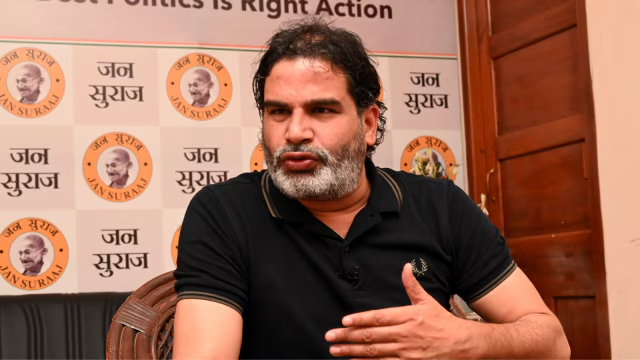Prashant Kishor earned Rs 241 crore over last 3 years through consultancy services

Image via The Indian Express
PATNA, BIHAR – In a stunning disclosure that pulls back the curtain on the multi-crore industry of modern Indian electioneering, it has been revealed that political strategist Prashant Kishor’s consultancy services generated a staggering revenue of Rs 241 crore over the last three years. The figure, which has emerged from recent financial filings, has sent shockwaves through the political landscape, cementing Kishor’s status as a titan of his field while simultaneously raising complex new questions about his ongoing transformation from a backroom kingmaker to a grassroots mass leader.
The revelation provides a stark, monetary value to the brand that is ‘PK’—a brand built on a near-mythical reputation for crafting election-winning campaigns. However, as Kishor walks the dusty roads of his home state in his ambitious ‘Jan Suraaj’ padayatra, this number also presents him with his greatest political paradox: can the ultimate insider, who earned a fortune professionalizing the very system he now critiques, successfully sell himself as an anti-establishment outsider?
The Man with the Midas Touch
To understand how a political consultancy can generate such astronomical figures, one must look at Prashant Kishor’s unparalleled track record. For over a decade, he has been the man with the Midas touch, the architect behind some of the most significant and surprising electoral victories in recent Indian history.
His journey to the pinnacle of political strategy began with the now-legendary 2014 campaign for Narendra Modi, where his firm, then known as Citizens for Accountable Governance (CAG), helped script a landslide victory. From there, Kishor and his rebranded Indian Political Action Committee (I-PAC) went on a stunning run. He was the mastermind behind:
- Nitish Kumar’s decisive victory in the 2015 Bihar Assembly elections.
- Captain Amarinder Singh’s triumph in Punjab in 2017.
- Jagan Mohan Reddy’s political landslide in Andhra Pradesh in 2019.
- The DMK’s powerful return to office in Tamil Nadu in 2021.
- And most famously, Mamata Banerjee’s incredible feat of defeating the full might of the BJP electoral machine in the high-stakes 2021 West Bengal Assembly elections.
Each victory added to his aura, making him the most sought-after, and evidently the most expensive, political strategist in the nation. Political parties, desperate for a winning edge, were willing to pay a premium for his services, which blended data analytics, large-scale communications strategy, and an uncanny gut for the political pulse of the electorate.
Decoding the Numbers: The Corporatization of Politics
The Rs 241 crore figure, it is important to note, is understood to be the gross revenue of I-PAC, the organization he helmed. From this, the firm would have paid salaries to its hundreds of employees—a diverse group of young professionals from top universities—and covered massive operational costs. Nonetheless, the number is a powerful symbol of the complete corporatization of Indian politics.
Elections are no longer just fought on the ground; they are managed from corporate-style war rooms. The modern campaign is a sophisticated, data-driven enterprise, and Prashant Kishor was its pioneering CEO. The financial disclosure, believed to be part of the regulatory filings for his Jan Suraaj campaign as it moves towards becoming a formal political party, quantifies for the first time the immense financial scale of this new political reality.
The Strategist vs. The Politician: A Tale of Two Personas
The timing of this revelation could not be more critical, as it creates a stark contrast between Kishor’s two personas.
There is the Prashant Kishor of the past: the elite, globe-trotting strategist, flying in private jets, holding meetings in the war rooms of the powerful, and commanding crores for his expertise.
And then there is the Prashant Kishor of the present: the activist, clad in simple clothes, undertaking a grueling, year-long walk across the impoverished villages of Bihar, speaking the language of system change, and positioning himself as a man of the people.
This disclosure now forces a collision between these two identities. It begs the question: how does a man who earned a fortune by helping the very parties he now criticizes maintain his credibility as an agent of change?
The Political Fallout: Ammunition for Rivals
His political opponents in Bihar have already seized on the news. Leaders from the ruling JDU-RJD alliance are expected to use this figure to paint Kishor as a “political mercenary” and a “corporate agent from Delhi” who has no real understanding of Bihar’s grassroots issues. The narrative will be that he is a consultant, not a leader, and that his current campaign is just another well-funded, professionally managed project, not a genuine people’s movement.
Kishor’s camp, in response, will likely frame the disclosure as a mark of transparency. Their argument will be that he earned his money legally and professionally in his previous career, unlike many career politicians who allegedly amass wealth after entering public office. They will argue that these earnings are precisely what allows his Jan Suraaj movement to be independently funded, free from the influence of the corrupt political financiers he so often rails against.
Ultimately, the Rs 241 crore revelation is a double-edged sword. It is a testament to his unmatched professional success. But in politics, perception is reality. As Prashant Kishor stands at the crossroads of his career, attempting to make the toughest transition in public life, his greatest asset—his brand value—has just become his greatest liability.